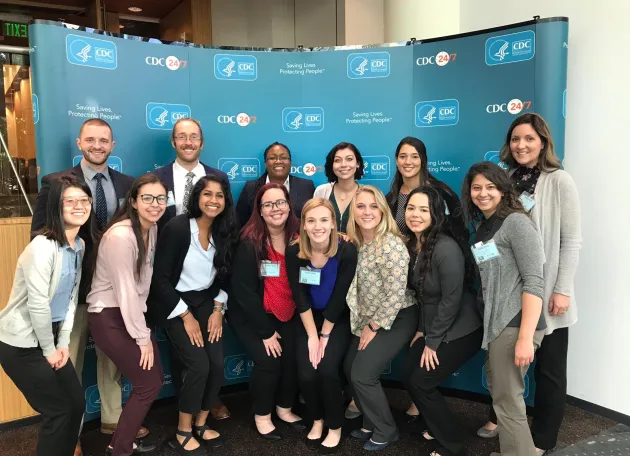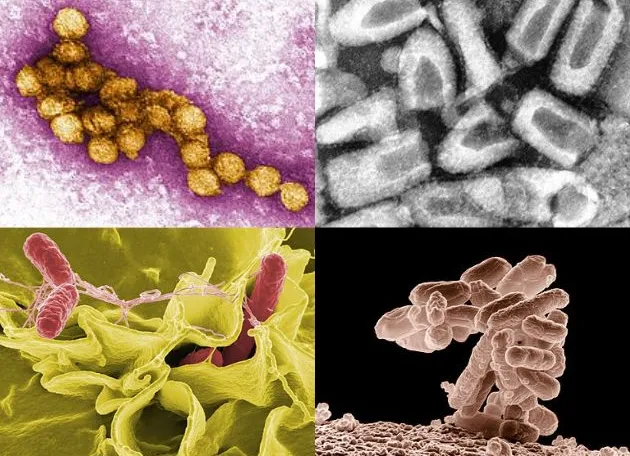What is Veterinary Public Health?
The veterinary sciences are relevant to more than just animal health. They also play an important role in the maintenance of the health of human populations.

What are Zoonotic Diseases?
There are over 250 infectious diseases that are transmissible from animals to humans, which are called Zoonoses, like West Nile Virus and Rabies. Examples also include food or waterborne diseases caused by pathogens, such as Salmonella and E. coli. Contaminated food causes an estimated 6.5 to 33 million illnesses and 9,000 human deaths in the United States.

Discover the critical link between animal and human health with the Veterinary Public Health Specialization
In Ohio, a startling more than 48% of human diseases reportable to the Ohio Department of Health are zoonoses, posing serious threats to public safety. Among them, respiratory coronaviruses like SARS and avian influenza (bird flu) continually emerge, presenting ever-evolving challenges for public health professionals.
The source of these zoonotic pathogens, including those causing foodborne illnesses, lies primarily with animals such as pets, livestock, and wildlife. Consequently, professionals trained in veterinary sciences are uniquely qualified to tackle these pressing public health issues.
To comprehensively address the complex interplay between human and animal health, public health practitioners must acquire a profound understanding of the epidemiology and ecology of zoonotic and foodborne diseases. Recognizing this need, The Ohio State University's College of Veterinary Medicine and College of Public Health have joined forces to create the Veterinary Public Health specialization (VPH) within the Master of Public Health (MPH) degree program.
Accredited by the American College of Veterinary Preventive Medicine (ACVPM) in 2010, the Veterinary Public Health specialization at Ohio State stands out for its comprehensive curriculum in this vital field of study. Graduates of the OSU MPH-VPH program gain the expertise to develop and execute impactful public and private health programs aimed at preventing and controlling zoonotic diseases in both animal and human populations.
Completing an MPH degree with a specialization in Veterinary Public Health offers pre-professional students a broader background and an expanded knowledge base in the health sciences, serving as a solid foundation for those planning to pursue a DVM or other professional degrees in the fields of medicine or nursing. Embark on a rewarding journey at the forefront of public health and animal welfare with our Veterinary Public Health specialization. Veterinary students can formalize their public health training by pursuing a combined degree, which typically adds an additional year post-DVM to earn a DVM-MPH.
Program Leaders
Associate Director
Amanda Berrian, DVM, MPH, PhD, Dipl ACVPM
Graduate Education Coordinator
Allison Bevinger, MAEd
bevinger.3@osu.edu
Frequently Asked Questions
The Master of Public Health (MPH) degree is the standard professional public health degree recognized worldwide. Students enrolled in Ohio State's College of Public Health may specialize in one of six basic areas: Biomedical Informatics, Biostatistics, Epidemiology, Environmental Health Sciences, Health Behavior and Health Promotion, or Veterinary Public Health.
The Veterinary Public Health specialization within the MPH program at The Ohio State University will provide students with the public health credentials to serve as leaders in zoonosis prevention and control programs in the US and worldwide. Students will gain an understanding of the epidemiology and ecology of zoonotic diseases in pet animals, livestock, and human populations. Students will also learn about animal population systems, including the roles of companion and food-producing animals in society, food production and distribution systems, biosecurity programs, and intervention strategies. Upon completion of this program, students will be well-prepared for a rewarding career with a variety of industries or governmental agencies. The Veterinary Public Health specialization can also be easily tailored for students who intend to enter the professional veterinary medicine (DVM) training program at Ohio State or elsewhere.
Any student that has completed a bachelor's degree from an accredited institution and an undergraduate GPA of 3.0 or better is eligible to apply to the MPH degree program. Students should select the Veterinary Public Health specialization within the MPH program if they wish to pursue a public health career related to the prevention and control of zoonotic and foodborne diseases in animal and human populations. Specialized training in Veterinary Public Health will also benefit students who intend to enter the professional veterinary medicine (DVM) training program at Ohio State or elsewhere by providing expanded knowledge and training in a complimentary health sciences discipline.
The curriculum for the Master of Public Health degree consists of a minimum of 45 semester credit hours organized into five curricular domains: Core courses in areas of knowledge basic to public health (12 semester credit hours), courses required for the Veterinary Public Health specialization (18 semester credit hours), elective courses related to Veterinary Public Health (10 semester credit hours), practice placement (2 semester credit hours), and a culminating experience (3 semester credit hours).
The Master of Public Health degree requires that all students take at least one course in five areas of knowledge basic to public health: epidemiology, biostatistics, environmental health sciences, health behavior and health promotion, and health services management and policy.
The required courses for the Veterinary Public Health curriculum will include the topics of infectious disease epidemiology, zoonotic diseases, food safety and biosecurity, as well as environmental health and related issues.
No, Veterinary Public Health students will participate in a wide variety of educational activities both on and off campus. Students will have the opportunity to directly interact, both in and outside the classroom, with recognized experts in the field of Veterinary Public Health. In addition, students will gain practical experience during an off-campus practice placement. They will also have a culminating experience in which they will conduct a field research project in a relevant area of interest in conjunction with their advisor.
The Department of Veterinary Preventive Medicine has among its faculty a wide range of experts with research interests related to zoonotic and foodborne diseases. They include food safety microbiologists, epidemiologists, virologists, and parasitologists. They work with companion animals, dairy and beef cattle, swine, sheep, poultry, zoo animals, wildlife, and exotic animal populations.
Individuals with the MPH degree and specialized training in Veterinary Public Health will be well qualified for rewarding public practice careers in both state and federal governments, non-governmental organizations, industry, and agribusiness. Potential employers include public health agencies ranging from state Departments of Health to federal agencies such as the US Department of Agriculture (USDA), the Centers for Disease Control and Prevention (CDC), and the US Public Health Service, as well as international agencies such as the Food and Agriculture Organization of the United Nations (FAO), and the Pan American Health Organization (PAHO). In addition, students with specialized training in Veterinary Public Health will be competitive for public health-related positions in the food processing, food service, and pharmaceutical industries. Completion of the MPH degree with a specialization in Veterinary Public Health will also help students who plan to pursue a DVM degree by providing a broader background and expanded knowledge base in the health sciences prior to entering the professional veterinary medicine (DVM) program.
The MPH degree program at The Ohio State University requires 1.5 to 2 years to complete, depending upon the individual courses, practice placement experience, and research project chosen by the student. Students in the Veterinary Public Health specialization who are accepted into the professional veterinary medicine (DVM) program after the first year can still complete their MPH degree. These students will work closely with their advisor to complete the practice placement and field research project requirements for the MPH degree during the summer term. The MPH degree can be awarded to these students prior to the completion of their DVM degree.